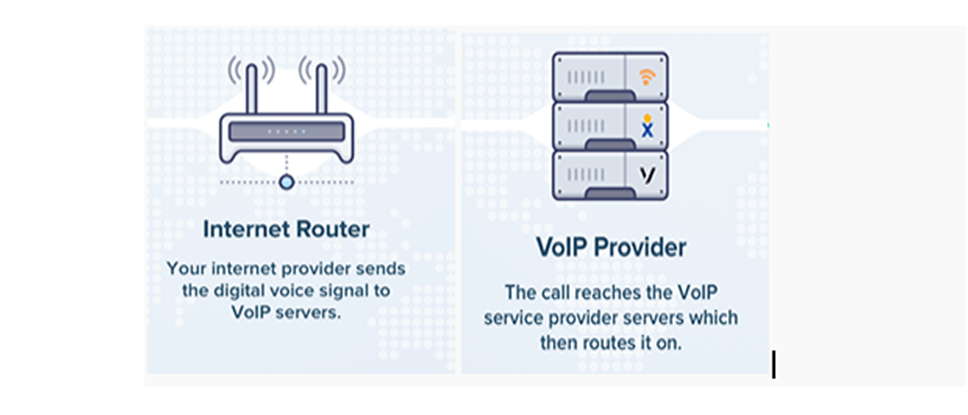
The VoIP (Voice over Internet Protocol) market is anticipated to expand by around $20 billion between 2021 and 2026. Business usage, which has increased recently due to the COVID-19 epidemic, is one of the key causes of this rise. During the pandemic, several companies allowed workers to work from home for the first time. As a result, they had to transition to a phone solution that would enable them to do business remotely while ensuring security.
To increase the adaptability of their teams, many embraced VoIP, the digital version of voice communication, and other cloud-based communications technologies.
VoIP, however, provides small businesses with much more than just additional flexibility. It offers significant advantages that can improve consumer satisfaction and spur expansion. Let’s explore the key advantages of VoIP for small businesses so you can choose whether you ought to update your organization’s phone system.
VoIP Phone System: What it is and Its Role in Businesses
VoIP means “Voice over Internet Protocol.”
As the name suggests, VoIP is a technology that allows its users to make and receive calls over the Internet. VoIP converts sound into a digital packet of information and sends it to the receiver via a broadband line. It is the same as making phone calls using a regular landline. Although, you will need a broadband connection to start a conversation via VoIP.
Simply explained, it transforms sound into digital information packets so that it may be transferred via broadband internet. VoIP makes it possible to have discussions wherever there is an internet connection.
Today, VoIP has become a popular technology because of its flexible and reliable nature. You don’t need additional hardware after the installation to get started with VoIP. Hence, it is a much more cost-effective option as compared to a traditional phone. And, today, almost every business, especially mid and small-sized enterprises uses VoIP as their professional essentials.
Most people are acquainted with VoIP solutions, such as Microsoft Teams, which have enabled voice and video calls over the internet in response to the surge in remote and hybrid working. Teams is only one of several software programs that can be categorized as a VoIP solution.
How does VoIP work?
You might be wondering how you are able to connect with anyone anywhere in the world. Well, the mechanism is quite simple and we’ll break it down for you.
To get a better understanding of how VoIP operates, let’s look at what transpires during a call on a VoIP phone:

When you place a VoIP call, the VoIP adaptor converts the analog audio signal into a digital

Following a transmission through your internet to the business phone service provider, the message is subsequently sent to your customer’s phone.

Due to the virtually instantaneous nature of this procedure, VoIP conversations occasionally have sound quality that surpasses traditional phone calls.

How is VoIP different from a Traditional Phone System?
VoIP functions differently from a traditional landline phone system.
Circuit switching is the technology used in conventional telecommunication systems to link calls. You and the person on the other end of the connection are connected in a circuit when you place a call via the Public Switched Telephone Network (PSTN).
‘Circuit switching’ technology has been in use for more than a century at this point. Although it is not the most effective or efficient, it is dependable and continues to function.
The ‘packet switching’ technique is used in VoIP instead. Data is only sent when it is required, according to this. Every time you talk, a quick, fleeting connection is made. The connection does not always have to be reciprocal. Normally, you won’t be speaking at the same time as the person you’re talking to.
Additionally, data packets are transmitted effectively. They have a wide range of options for using the Internet. When the packages arrive at their destination, they are then assembled once more.
To save space, the data packets might also be compressed. They can now navigate the internet even more swiftly thanks to this.
Everything happens pretty quickly. You won’t experience any delays throughout the call unless your internet connection is acting up.
How to Make a Call Using VoIP
You first need a VoIP business phone service in order to make a VoIP call. Additionally, you need a strong internet connection. Typically, this entails connecting to a broadband internet connection.
After that, you may now use any of the following devices to make a VoIP call:
1. Your smartphone: Once more, you’ll require the proper app and a wifi connection. A mobile data plan with 4G or faster speeds is also an option. Most VoIP applications are compatible with all smartphones, including Apple iPhones (iOS) and Android smartphones.
2. A unique IP phone: It functions and appears like a typical phone. It has a button-equipped handset that fits into a charging cradle. The IP phone, however, uses an RJ-45 connector rather than an RJ-11 phone connector. This indicates that it connects to your router’s ethernet port rather than a phone connector. You might receive a free phone handset from some VoIP providers depending on the time of year.
3. Your current handset: An ATA (analog telephone adapter) can be used to connect this to the VoIP system, giving it an IP address. In essence, you simply connect your phone to the ATA rather than directly to your power socket.
4. Your laptop: An app that enables VoIP calling is required. Softphone’ is another name for this. Of course, a sound card, a headset, or a microphone and speakers are also necessary. Additionally, you will want ethernet or wifi for internet connectivity. The majority of well-known VoIP providers have Windows and Mac apps.
9 Major Benefits of VoIP Systems For Small Enterprises
1. Cost-Effective
Budget is one of the prime aspects of a business that a businessman must not ignore. And, if you can save more than half a buck just by choosing a new method, you must choose it. Likewise, you can save 50% of the money you’re spending right now by installing a VoIP phone in your business.
While installation of the local phone requires various hardware and types of equipment, VoIP can be handled via software or cell phones. Also, a local phone first requires a wiring installation before it works properly. Moreover, you need a professional engineer to examine all these powerlines whenever they stop working. On the flip side, VoIP doesn’t need powerline installation and will work perfectly on your existing internet connection. Plus, you will save space and cost for moving locations because VoIP doesn’t require you to host the phone system.
Overall if we talk about the cost, an average phone line will cost you $50. And, if you get a severe wiring problem, it could go around $70-120 per user. Meanwhile, VoIP comes in different packages and plans but on average it can cost $20 per user. It is clear how VoIP lowers the maintenance, hardware, and service costs and cuts your phone bills by more than half. Therefore, it is a suitable option for startups and small businesses.
2. Better Voice Quality
VoIP is cheap but it doesn’t mean it lacks quality. Even VoIP gives you a better calling experience as compared to traditional phone calling. If you have a stable and fast internet connection, you will get a crisp and clear voice quality without any lag or call drop-out issues. In short, you’ll get a superior calling experience but you must have a reliable internet connection with good bandwidth.
Moreover, VoIP phones are made with the agenda of creating a more professional environment for business meetings. Therefore, VoIP phones come with features like noise-canceling microphones and advanced audio compression. As a result, you get a quality calling experience as well as a productive meeting, without any interruptions.
3. Advanced Security System
Now you might think- does a phone system require any kind of security? Well, the answer is yes. Unfortunately, most of the people who use the phone don’t think about it and end up committing fraud. Comparitech shares the stats– In 2019, around 40% of all the phone calls received in the US were spam calls. In the business world, security is a big deal and you can’t neglect this fact. Moreover, these frauds are increasing day by day. According to TechRepublic, phone scams will go upward up to 270% in 2020 than in 2019.
Moreover, VoIP has advanced IP technology and improved identity management. Also, it comes with features like push notifications for suspected behavior, undergoes independent security audits, and strong password recommendations. Plus, you get hosted VoIP providers who work all the time to protect their networks. VoIP can help you a lot to make your business secure from security threats and scam phone calls. You only have to find a trustworthy VoIP provider that promises to give you all these security features. That’s how you make your business more secure, and reliable, for a long extended run.
4. Wide range of Accessibility
This is one of the prime benefits of VoIP and every small business fell in love with it. Your VoIP phone will not be installed in a fixed location. Moreover, it is like a cordless phone with a cloud-based VoIP service. So you can take it with you wherever you go to make calls from anywhere. Just make sure to have a stable and fast internet connection.
Moreover, this single VoIP feature leads you to more benefits that increase your productivity multiple times. For example, right now, every business is being preferred to work from the home method. VoIP phones allow your employees to work without presenting physically at the office. Also, VoIP allows you to retain the same VoIP number. Even after you changed your business address. Therefore, it could be one of the best options for nomadic people who travel while running a business remotely.
5. More Scalable
In finance, Scalability means how we increase the company’s profit or efficiency after-sales volume increases. As a startup, small, or mid-sized business, it’s hard to determine the number of resources you will need, especially the phone lines. Still, a communication system is a prime aspect of your business because no communication equals no sales. And, no sales equal to no profits.
Moreover, VoIP can help you to rise up from this confusing situation. With VoIP technology, you can add a new line as soon as a new staff member enters your company. Likewise, you can reassign an existing line to another executive or you can remove it completely. Furthermore, you won’t need any expensive hardware and a dedicated line to set up a new communicator for a new office member. No matter, if your business is growing at a pace of 87% or you recently opened another business branch, you can easily scale your business using VoIP phones.
6. Multitasking
VoIP is not like a traditional phone but it allows you to do much more than that. It allows you to add various kinds of VoIP integrations to the system. Later, you can use these integrations to execute various functions. Therefore, you can easily do multitasking to increase your work efficiency by using VoIP.
Moreover, you can send various kinds of documents to the receiver via VoIP. Alongside the documents, you also can send images and videos to your client and staff members. Plus, you can share all these files without terminating the conversation/meeting you’re attending right now.
Furthermore, you can execute multiple tasks just by choosing the right kind of VoIP integrations. For example, Salesloft to monitor sales, Typeform to embed a form on any platform or page, or PicSync to sync your contact list with CRM and other services. Clearly, VoIP is to do more than just sharing conversation.
7. Compatibility
Furthermore, VoIP is like having a voice communicator that digitizes audio and sends and receives it online. In short, it’s the latest technology. And, if you want to use it with the newest headsets, smartphones, and other latest accessories, you can do that without having any issues. Therefore, if you are going to buy new technology for a better work experience, don’t hesitate to think about compatibility issues.
8. Advanced Features
Alongside the above basic features, VoIP also comes with some advanced features. Auto-attendants and automatic call forwarding are the popular ones.
Many of the solopreneurs are taking advantage of the Auto-attendant (Virtual receptionist) feature of VoIP. They use this feature to dial and answer calls, as well as to deliver recorded messages in multiple numbers. This feature makes their one-man or a few-man company look like a well-developed one. Many companies are using the virtual receptionist feature to provide customer support to their customers. So the automated directories and updated information automatically try to solve a customer’s issue. Although, it shouldn’t have to require an executive’s manual actionability.
Furthermore, Automatic call forwarding of VoIP helps you to manage phone calls while you’re busy in an important meeting. This feature will automatically take calls and redirect them to another line. Now when this feature will automatically take calls- when you discard phone calls, or when you don’t pick up the phone? Also, on which line will it redirect the call? You can edit all these settings according to your preferences and priorities.
Also, features like 3-digit dialing, call queue, and voicemails to emails make the VoIP phone system best for small and mid-sized businesses.
9. Works Great with Softphones
Softphones are programs that you install the same as you install in devices, such as PCs, Tablets, or smartphones. However, softphones are specifically designed to make phone calls through the internet. For example, Skype. Moreover, these softphones are getting popular among startups due to their multiple advantages. For instance, it’s portable, cost-effective, and saves extra desk space.
Furthermore, if you support work-from-home style, softphones are your friends. They allow you to connect with your colleague or boss from any part of the world. Also, smartphones present exciting features to make you more productive and to get the most out of your work.
The Cons of VoIP Phone Systems
VoIP is a fantastic technology, but it might not be ideal for everyone. There are a few drawbacks to VoIP that you should be aware of:
1. Requires Strong and Reliable Internet
To make phone calls, a reliable internet connection is required. You need an internet connection to make phone calls, as we covered in the section on how VoIP functions.
Your call quality may suffer if your internet is unreliable. The fact that VoIP technology doesn’t consume as much bandwidth as you might anticipate is a plus. VoIP calls can be made with a reliable connection with a ping time of no more than 70 ms and an upload speed of no less than 500 kbps.
However, if you have a large staff in your workplace, you might need to consider your bandwidth requirements for the number of simultaneous calls your company will be making.
2. Not Useful in case of Power Outages
During blackouts, regular phone service continues to operate. However, if you don’t have power or internet connectivity, you can’t make VoIP calls.
Typically, WiFi routers power wireless internet in most offices. These routers require electricity, therefore if there is a power outage in your building, your internet service may also go down, which will have an effect on your VoIP service.
3. There is a Need for Thorough Training
When you change your phone system, you must teach your personnel how to utilize it.
Fortunately, the majority of VoIP services are made to be as simple and easy to use as possible. This indicates that even if your workers work remotely, it should be simple to train team members on how to utilize the cloud phone systems.
Final Verdict
VoIP phone systems for Small Business are great and they come with many useful benefits. VoIP has superior voice quality, advanced security systems, a scalable nature, and a cost-effective price. All these options make VoIP an ideal choice for startups and small businesses. Small businesses perform under a dense budget but need all these functionalities to grow faster. Moreover, a wide range of compatibility, multitasking, and added features are the cherry on the top of the cake.
In conclusion, VoIP phones are one of the best decisions you’ll ever make as a small business owner. All you need is a stable and fast internet connection to get all the benefits from VoIP. For more expert advice on VoIP services contact Telco ICT.
Table of contents
Related Posts
We’ll handle the tech
so you can get on with
running your business.

CALL US
1300 414 214
Our Trusted Partners
Contact Us
Let’s Talk
Common Questions
Do you outsource your work overseas?
No. We use local teams only. That way we can respond more quickly to any problems that may occur. We want your tech running smoothly so you can focus on what you do best.
Is your support 24 hours?
Yes. We have people available whenever you need us. We understand that your tech runs 24 hours, and you need it be working at all times.
Are your services customised for my business?
Yes. There is great off the shelf software. But we know one size never fits all. So anything we set up for you is designed to make your business run smoother and in the way you want it to.
Are your services expensive?
No. Reliable tech is the life blood of your business. We keep it running smoothly so your business can keep making money. All our services are fixed fees, so you never get any nasty surprises.
What’s the next step?
Simply book a chat with one of our experts. We’ll have a chat about exactly what you need and how we can help. If you like our approach then we’ll give you a fixed price quote and get everything up and running for you, fast!








